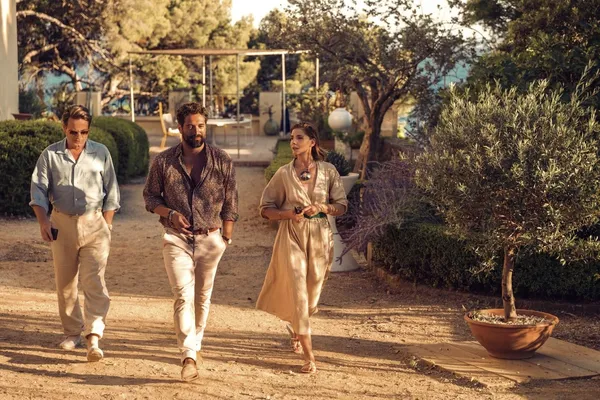 |
| Philippe (Benoît Magimel) and Andres (Nuno Lopes) with Calypso (Clotilde Courau) in Rebecca Zlotowski’s An Easy Girl (Une Fille Facile) |
At the UniFrance and Film at Lincoln Center’s 25th Rendez-Vous with French Cinema, just days before the announcement came that Rebecca Zlotowski’s An Easy Girl (Une Fille Facile), co-written with Teddy Lussi-Modeste, and starring Mina Farid, Zahia Dehar, Benoît Magimel and Nuno Lopes would be the last screening of the festival, I met with the director at the Elinor Bunin Munroe Film Center. Governor Andrew M Cuomo announced at that time (March 13) that he was limiting gathering in public spaces due to the coronavirus pandemic in New York, which eventually led to the closing of all cinemas by March 16.
 |
| Rebecca Zlotowski on Benoît Magimel: “There’s something about him being very melancholic, very sad.” |
In the second half of my conversation with Rebecca Zlotowski, André Gide, Marguerite Duras, Catherine Deneuve cooking in Jacques Demy’s Peau d’Âne (Donkey Skin), Benoît Magimel in Michael Haneke’s The Piano Teacher and Étienne Chatiliez’s La Vie Est Une Fleuve Tranquille, Marie NDiaye’s novel La Cheffe, and deconstructing certain stereotypes in An Easy Girl all came up.
There is nothing easy about being an easy girl. Naïma (Mina Farid) has just turned 16. She lives in Cannes with her mother who works as a maid in one of the fancy hotels. When her older bombshell cousin Sofia (Zahia Dehar) visits for the summer, a new chapter begins in her life. Orphaned Sofia has Carpe Diem tattooed on her lower back. She wears the most revealing clothes, to the point where her performance of femininity is so over-the top that she frightens the local boys.
Sofia accepts expensive designer clothes and bags and jewellery from older rich men without the slightest qualms. Naima is in awe and bewildered as she tags along when Sofia befriends two rich art dealers and joins them on their yacht (Benoît Magimel and Nuno Lopes). Class barriers and gender expectations, decency and lust, power and corruption, luxury and abandon - Rebecca Zlotowski twirls tropes into a pungent summer romance with a great mellow soundtrack. The easy way out may be the hardest one of all.
 |
| Philippe (Benoît Magimel) and Andres (Nuno Lopes) |
Anne-Katrin Titze: The casting of Benoît Magimel is great – somehow he can never get rid of The Piano Teacher.
Rebecca Zlotowski: I love that film. In France Benoît Magimel is famous since he was a child. Before the Haneke he became very successful and very famous because of a film, based on a social exchange. It’s called La Vie Est Une Fleuve Tranquille [directed by Étienne Chatiliez, 1988].
As a child he became famous. He’s a poor guy and there’s an exchange at birth and he’s raised wealthy. Much more connected to the social and class struggle than the masochistic or domination flirtation thing. I connected much more to his melancholy. There’s something about him being very melancholic, very sad. There’s a sadness that moves me to tears.
AKT: I found the combination of him with the actor who plays Andres very interesting.
RZ: Yes, Nuno Lopez, he’s a Portuguese actor. I wanted to say that the violence is sometimes stronger among your own class, than in between [classes]. The fact that Benoît Magimel is definitely factotum to Nuno Lopez, to the Brazilian billionaire. He is hired by him. He is his whore in a way. He is maybe the one who prostitutes himself more in the film. More than the girl.
 |
| Rebecca Zlotowski on Naïma (Mina Farid): “I really wanted the film to explore these moments in life when you know that you have to choose your values.” |
AKT: Yes, the way he tells him to fetch the sextant! And then you have a third man, the bodyguard.
RZ: Yes, the steward on the yacht. Who is absolutely mean to the young girls [Mina Farid as Naïma and Zahia Dehar as Sofia] because he is part of their community. And he hates them bossing him where he is working. There is a class despise and violence that is much more interesting than between the rich guy.
AKT: There are so many subtleties. When Naïma is at dinner in the restaurant in the hotel where her mother works. She knows the cooks and she belongs to both sides and to neither.
RZ: Exactly.
AKT: She belongs nowhere and she watches.
RZ: The setup was that. In a very modest way, I really wanted the film to explore these moments in life when you know that you have to choose your values. I mean, André Gide says until you are 20 years old, you have to buy your values. And she is buying them. It’s just is she following Sofia?
 |
| Sofia (Zahia Dehar) with Naïma (Mina Farid) |
Is she following what her mom decided for her, which is stay in the same class? Does she want the in-between, like the chef of her class? Then she becomes a chef. Which is the title of a Marie NDiaye novel, which I really loved, La Cheffe. She feminised the word.
AKT: I also thought of the fairy tale connection. How many heroines become cooks for a while. Peau d’Âne, All Fur.
RZ: Oh, that’s true. I never noticed that. But in the tales of the 19th century she cooks in a domestic way. I wanted her to cook in a bossy way. There is still this problem, all the women cook all the time, but the chefs are men. Now these things are changing.
AKT: The casualness, you show in your film, of wrongly accusing someone of theft, I like very much how you were structuring these scenes. There is nothing left open for us to speculate. No, this is how these people function.
RZ: Absolutely. This is the crime in the film. To me it’s a huge crime, in order to get rid of someone, to accuse him or her to be a thief. This is where the character loses. The Brazilian guy loses everything at this moment. And I clearly wanted to take a side. It’s not a whodunnit.
 |
| Philippe (Benoît Magimel) and Andres (Nuno Lopes) with Calypso (Clotilde Courau) |
And there is this object which is like a fairy-tale thing. It’s called “sex-something” [the sextant], it’s a navigation instrument, no one cares. It’s like a thing in a graphic novel or a cartoon. With this cartoon thing I really wanted to take sides and strongly say that they are wrong. And they were right. And revenge a little bit.
AKT: When they visit their friend Calypso [Clotilde Courau] in the fantastic villa and have the discussion over lunch, overlooking the beautiful landscape. The Marguerite Duras scene.
RZ: This is so funny.
AKT: You have the competing décolletés - competing on so many levels. Andres simply sits there laughing at everything.
RZ: He is amused by that. I really wanted this scene to revenge and deconstruct certain stereotypes. But in a funny way.
 |
| Rebecca Zlotowski and Sabri Louatah’s Les Sauvages |
AKT: The two Duras book titles mentioned, The War: A Memoir and The Lover, mirror what we are asking ourselves. Is this a war or are they lovers? The actress who plays Sofia is an Instagram personality, I read? I don’t know her at all.
RZ: Zahia Dehar? Yes, she has a backstory. The backstory is interesting to add a certain layer, when you’re French. But I’m very happy and glad to show the film abroad because obviously we do not need to know that in order to be seduced and inspired by the way she talks, which is so weird, and the way she behaves, which is so sophisticated. This is why the character and this person inspired me for the film.
Read what Rebecca Zlotowski had to say on French Minister of Culture Franck Riester testing positive for the coronavirus, a tattoo in An Easy Girl (Une Fille Facile), an homage to Éric Rohmer and Les Sauvages with Sabri Louatah.





















